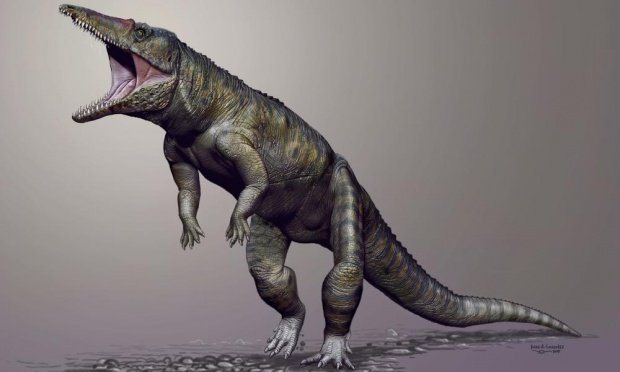A previously unknown prehistoric crocodile, whose bones were found in Chatham County, North Carolina, several years ago, has been named Carnufex carolinensis.
Paleontologist Lindsay Zanno says she chose Carnufex carolinensis which is Latin for “Carolina butcher”.
“I thought it had a nice ring,” said Lindsay Zanno, a research professor at N.C. State University who also runs the paleontology and geology lab at the N.C. Museum of Natural Sciences.
“When I saw this animal, and when we reconstructed its skull, it was clearly an animal built for slicing flesh.”
The discovery of the Carolina butcher will be announced next week in a paper in the journal Scientific Reports and with a public presentation at the science museum in downtown Raleigh starting at 11 a.m.
The presentation includes an artist’s rendering of what the creature might have looked like, based on the few bones that were found and what’s known about its closest relatives.
This specimen was about 9 feet long and was probably a top predator, feasting on armored reptiles and early mammals found at the time, about 231 million years ago. This is the beginning of what’s known as the late Triassic Period, when what is now Chatham County was near the equator in a warm, humid environment of ferns and conifers.
Scientists know the age of the creature not from its bones but from the age of the rocks in which it was found, in a quarry more than a decade ago.

Museum curator Vincent Schneider found the bones mostly encased in rock and brought them back to the museum, where they remained a mystery for years.
Lindsay Zanno said Carnufex appears to be a missing link between creatures that stood on their hind legs and had skulls that resembled a Tyrannosaurus rex and later ones that moved around on all fours, like present-day crocs and alligators.
Scientists won’t know for sure until someone finds Carnufex’s hind limbs, but the animal’s small forelimbs suggest that it walked on its hind legs, Lindsay Zanno said.
The Carolina butcher is the second new ancient crocodile ancestor found near Raleigh and identified at the science museum in as many months. Last month, Appalachian State University geology professor Andrew B. Heckert announced the discovery of a new kind of aetosaur from the late Triassic Period with a distinctive ring of armor plates around its neck.
